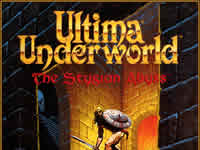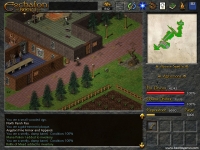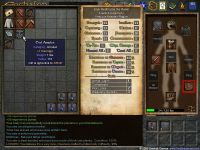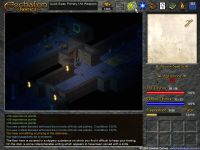|
Eschalon: Book 1 Interview
Brian 'Dhruin' Turner, 2006-02-13 
We recently discovered Eschalon: Book 1 and the old-school gameplay goals and clean 2D art generated quite a bit of interest. With turn-based combat and skills like cartography and perception, Eschalon looks likes an intriguing traditional cRPG. We had the chance to fire off some questions to Basilisk Games on this first of a planned trilogy...read on for the results.
RPGDot: Please introduce yourself and tell us a little about Basilisk Games.
Thomas Riegsecker: My name is Thomas Riegsecker and I am the Lead Developer on the game Eschalon: Book I. Basilisk Games is an independent studio formed about a year ago in Indianapolis, Indiana (USA), and our intent is to design old-school RPGs for the PC and Macintosh platforms.
RPGDot: Can you give us a summary of Eschalon: Book 1 and the gameplay it will offer? When you say, "designed to feel like the great RPGs of the past", what does this mean to you?
Thomas Riegsecker: When we started this project, we begin by replaying a lot of classic cRPGs (mostly from the mid '80s to the mid '90s) and we took note of key features that we wanted to incorporate into our game, such as the open-ended exploration model of the Ultima and Might & Magic series, the stat-heavy mechanics of the Wizardry series, and the turn-based gameplay featured in nearly every RPG of that era. We also noticed that these classic cRPGs didn't always take themselves so seriously; they weren't always as dark and drama-laden as modern RPGs try to be. These are just a few of the design elements we are trying to incorporate into the Eschalon series.
RPGDot: Can you give us an overview of the setting and gameworld?
Thomas Riegsecker: E:B1 is set in an environment that should be instantly familiar to anyone who has played a fantasy cRPG in the past 15 years. It is a world caught in a power struggle between two factions and it is inhabited with many traditional and original RPG archetypes. Except elves.
RPGDot: How is the gameworld organised and can you give us a feel for the size? Is it one continuous world or individual maps/areas? What sort of locations will players encounter?
Thomas Riegsecker: The gameworld is divided into individual map zones which require a very quick load when travelling between. Since we are still creating major sections of the game, I'm not sure exactly how many zones will exist in the final product, but it will be a large game. The world features a number of different environments from dungeons to wilderness, with a variety of unique effects, tiles and objects to keep each location feeling distinctive.
RPGDot: You've mentioned the story is about uncovering secrets of the protagonist's past - is there a danger this theme has been overused in recent RPGs? Do you have fresh take on this idea that you can reveal?
Thomas Riegsecker: The problem with any form of storytelling, be it in games, movies or books, is that regardless of how original you think your idea is, someone, somewhere, has probably already come up with something similar. With E:B1 we wanted to avoid the "Chosen One / Save the World" cliché that is still ridiculously overused in RPGs today. The "lost identity" scenario works well for E:B1 because it gives the player a chance to mould a raw character into anyone they want without having to adhere to any predispositions. The storyline is definitely interesting within the context of the gameworld and as far as we know the underlying story elements are fairly original…I'm sure someone will tell us if they're not! :) Either way, we promise it to be a lot more interesting than "the king has chosen you to save the world."
RPGDot: From the screenshots, there seems to be a fairly traditional skill- and level-based character development system. Can you expand on this, perhaps with some detail on the skills available?
Thomas Riegsecker: Again, we really wanted to capture the classic CRPG experience so we purposely kept a very traditional development system. It was important to make sure each Attribute and Skill has a tangible effect on your character and not just because they seemed cool to throw in. There are 25 skills available to your character covering weapon and armour usage, rogue and magical abilities and so forth, so your character will have plenty of development paths.
RPGDot: One of the major points your website makes is this is not another action/RPG. How big a role does combat play and is it possible - and viable - to build characters that don't focus on combat? Can you give us some examples of diverse characters builds?
Thomas Riegsecker: Combat has always been the foundation of fantasy role playing. E:B1 features as much combat as any classic cRPG, but we're avoiding the endless hack-n-slash, button-mashing gameplay found in some of the current generation Action RPGs. When we say it's "not another Action RPG", we are saying that we chose to not follow the same design trend that other RPG franchises have gone in the last ten years. Could you play E:B1 without focusing on combat? Well, you can certainly develop a character that has the ability to avoid combat through the use of stealth and magic, but since the game focuses on old-school RPG mechanics, combat is still an important source of experience points. Character development would be greatly slowed, but not impossible, by avoiding combat.
RPGDot: In the recent interview with RPG Codex, you described the turn-based combat as having "streamlined rounds" that could --if the player chose -- play out almost as fast as an action/RPG. Does this imply simultaneous enemy movement or something along those lines? Are there any advanced tactical options such as aimed-shots, stances and so on?
Thomas Riegsecker: Yes, enemy movement appears simultaneous but only after the results of their actions have been predetermined in order of initiative.
Tactical options in E:B1 will not feature aimed shots or stances, but there are options for tweaking your character's attack and defence style to gain a combative advantage.
Strategy, for the most part, is about field placement, spell usage and weapon choice. Let me give you an example of combat based on a recent test session: I was moving my character through a semi-wooded area when I came upon three Salamanders (you can see one of these red devils in a screenshot on our website). My Hit Points were low enough that I knew I couldn't engage all three in close-ranged combat, yet I had only 4 arrows remaining in my quiver. I had learned the spell Entangle earlier in the session and so I decided to employ that. I cast Entangle on the closest Salamander which would hold him for six rounds. I used 3 arrows to dispatch the next closest target, and injured the third target with my last arrow. I swapped to a Short Sword and advanced upon the entangled Salamander, which was killed easily since it was bound. The last Salamander, already injured, was the only one I actually had to fight at close range.
Maximizing your character's assets is really the heart of strategy in E:B1. With the game's Skill system it's possible to have an effective Fighter-class character with magical abilities.
RPGDot: What sort of enemies will players encounter and how advanced is the AI in combat?
Thomas Riegsecker: Enemy variations in E:B1 run the gamut of classic RPG genotypes: wild animals, mythical creatures and various humanoids and sub-humanoids. Often we give them original names and unique skills to make them distinctive to the Eschalon game world.
Enemy AI is admittedly simple but effective: it is based on line-of-sight and disposition triggers. Enemies roam passively in their territory until they see you, at which point they can become aggressive if that is in their nature. An aggressive enemy will eventually become passive if they can no longer see you due to walls, barriers or invisibility. An enemy's path-finding skill varies based on their level of intelligence, and multiple enemies will try to encircle your character to limit your escape and maximize attack damage. Injured or frightened enemies may try to flee battle.
RPGDot: Eschalon: Book 1 is described as "non-linear", with freedom to leave the storyline and access to any area - can the player tangibly affect the storyline? What about multiple ways of solving quests?
Thomas Riegsecker: The player can't really affect the storyline because the story is based on events in the character's past, which of course has already happened. There are choices you'll be able to make when following the storyline and different endings can be reached based on these choices.
The quest function does support multiple completion flags so theoretically you can complete quests in multiple ways, but until it's tested backwards and forwards it's too early to tell how much flexibility we'll be able to have without breaking the quest log. Quests are still very early in development.
RPGDot: You have mentioned that NPCs can "clutter things up" - does this imply you see dialogue as less important than some other gameplay elements or is it just a matter of the right balance?
Thomas Riegsecker: There have been many good RPGs with fantastic NPC interaction, but we've all played RPGs where the NPC dialogue begins to take something away from the game. Maybe the dialogue becomes annoying because it's poorly written or acted, or it interrupts game flow because it does nothing to advance the storyline or breathe life into the gameworld. NPC dialogue is only as important as the storyline requires it to be. Developers need to acknowledge this, and as you said, find the right balance with the game's dialogue.
There is plenty of NPC dialogue in E:B1 and we want to make sure it works well within the flow of the game. We keep the NPC dialogue essential and informative by making sure dialogue branches don't wander too far off the current subject. Furthermore, E:B1's storyline is supported by a narrative script, so we don't have to rely on NPCs to tell the entire story.
RPGDot: The reputation system sounds very interesting - what does it entail, what sort of actions does it track and how do NPCs react to it? Are there any factions in the game?
Thomas Riegsecker: The game tracks your character's actions such as the types of quests you've accepted, how you treat NPCs, etc. When you enter new areas of the game, this "reputation" follows you, affecting the way NPC react to you as well as what kinds of quests you may be offered. There are no factions or guilds in Book I but it's a possibility for Book II.
RPGDot: Can you tell us about equipment and items in the game, such as weapons and armour? Is there anything like a crafting system? What about Alchemy?
Thomas Riegsecker: Right now the game features 200 base pieces of weapons, armour and clothing, and any of these can have an assortment of special titles, bonuses or effects associated with them. There are several hundred other unique items as well.
You cannot craft anything in E:B1, but you can perform alchemy by finding Reagents and Reactants in the game and then mixing them in an empty flask. The potency of your potions is based on your Alchemy Skill, and there is an assortment of concoctions you can make- from Health Elixirs to Greek Fire.
RPGDot: Is there anything you'd like to add in closing?
Thomas Riegsecker: We have been blown away by the amazing response we've gotten from the gaming community regarding this project. This is fantastic and we hope that everyone is pleased with the final product and ultimately, the entire trilogy.
I wish that we could incorporate every single suggestion that has been given to us through the many emails and forum posts we've read, but in the end we have to stay true to our original goal: to make a great old-school cRPG. As we've said before: we don't want to reinvent the genre. We're not trying to give gamers a never-before-seen RPG experience…on the contrary, we want players to feel like this is the same class of game that got them hooked on cRPGs in the first place. If we miss any classic RPG features in this game that players are looking for, please send us your requests… Book II will start development almost immediately after Book I ships!
Thanks to Thomas for his answers and we look forward to watching Eschalon: Book 1 over the coming months.
Basilisk Games
|









